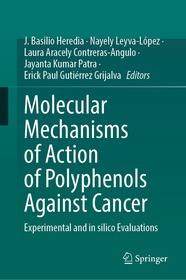
Molecular Mechanisms of Action of Polyphenols Against Cancer
Experimental and in silico Evaluations
-
12% KEDVEZMÉNY?
- A kedvezmény csak az 'Értesítés a kedvenc témákról' hírlevelünk címzettjeinek rendeléseire érvényes.
- Kiadói listaár EUR 213.99
-
88 752 Ft (84 526 Ft + 5% áfa)
Az ár azért becsült, mert a rendelés pillanatában nem lehet pontosan tudni, hogy a beérkezéskor milyen lesz a forint árfolyama az adott termék eredeti devizájához képest. Ha a forint romlana, kissé többet, ha javulna, kissé kevesebbet kell majd fizetnie.
- Kedvezmény(ek) 12% (cc. 10 650 Ft off)
- Kedvezményes ár 78 102 Ft (74 383 Ft + 5% áfa)
Iratkozzon fel most és részesüljön kedvezőbb árainkból!
Feliratkozom
88 752 Ft

Beszerezhetőség
Még nem jelent meg, de rendelhető. A megjelenéstől számított néhány héten belül megérkezik.
Why don't you give exact delivery time?
A beszerzés időigényét az eddigi tapasztalatokra alapozva adjuk meg. Azért becsült, mert a terméket külföldről hozzuk be, így a kiadó kiszolgálásának pillanatnyi gyorsaságától is függ. A megadottnál gyorsabb és lassabb szállítás is elképzelhető, de mindent megteszünk, hogy Ön a lehető leghamarabb jusson hozzá a termékhez.
A termék adatai:
- Kiadó Springer Nature Switzerland
- Megjelenés dátuma 2025. szeptember 27.
- Kötetek száma 1 pieces, Book
- ISBN 9783031996009
- Kötéstípus Keménykötés
- Terjedelem312 oldal
- Méret 235x155 mm
- Nyelv angol
- Illusztrációk XXVIII, 312 p. 47 illus., 38 illus. in color. Illustrations, black & white 699
Kategóriák
Hosszú leírás:
"
Recent and ongoing epidemiological studies point to the beneficial health effects of dietary polyphenols, with evidence suggesting that individuals with a high intake of polyphenol-rich foods have less incidence of noncommunicable diseases like diabetes, cardiovascular problems, and cancer. Multidisciplinary research on dietary polyphenols and what causes them to exert such benefits has led to discoveries which can help us to understand the mechanisms of action of these molecules, including the structure-activity relationships of polyphenols, the modulatory effects exerted on enzymes, reactive oxygen species, protein interactions, and the regulation of expression of some transcription factors.
In recent years, increased interest in bioinformatic studies has helped scientists predict and evaluate the interactions of polyphenols with protein targets involved in the onset and development of different types of cancer. Likewise, in silico evaluations coupled with experimental studies are a rising trend in many research areas. This contributed volume critically summarizes the experimental and in silico molecular mechanisms of action of dietary polyphenols, including phenolic acids, anthocyanins, flavanols, flavanones, and flavones against cancer. It is designed for researchers in academia and industry focused on cancer immunology and therapeutics, medicinal chemistry, and food science (functional foods, nutraceuticals, natural products, food technology), as well as graduate students preparing for a career in these areas.
" TöbbTartalomjegyzék:
"
Chapter 1. Phytochemicals as Potential Biopharmaceutical Agents.- Section I. In vitro, in vivo, and clinical evidence of the anticancer potential of polyphenols.- Chapter 2. Anticancer potential of phenolic acids.- Chapter 3. Anticancer potential of anthocyanins.- Chapter 4. Anticancer potential of flavanols.- Chapter 5. Anticancer potential of flavanones.- Chapter 6. Anticancer potential of flavones.- Chapter 7. Anticancer potential of flavonols.- Section II. In silico approach.- Chapter 8. In silico tools in the evaluation of the anticancer potential of phenolic acids.- Chapter 9. In silico evaluations of the anticancer potential of anthocyanins.- Chapter 10. In silico evaluations of the anticancer potential of flavanols.- Chapter 11. In silico evaluations of the anticancer potential of flavones.- Chapter 12. In silico evaluations of the anticancer potential of flavonols.- Chapter 13. Perspectives and Conclusions.
" Több



